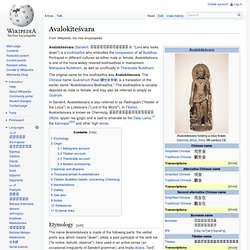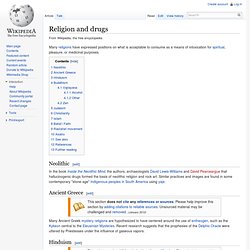

Avalokiteśvara. Avalokiteśvara (Sanskrit: अवलोकितेश्वर lit.

"Lord who looks down") is a bodhisattva who embodies the compassion of all Buddhas. Portrayed in different cultures as either male or female, Avalokiteśvara is one of the more widely revered bodhisattvas in mainstream Mahayana Buddhism, as well as unofficially in Theravada Buddhism. The original name for this bodhisattva was Avalokitasvara. The Chinese name Guānshìyīn Púsà (觀世音菩薩) is a translation of the earlier name "Avalokitasvara Bodhisattva. " Religion and drugs. Many religions have expressed positions on what is acceptable to consume as a means of intoxication for spiritual, pleasure, or medicinal purposes.

Neolithic[edit] In the book Inside the Neolithic Mind, the authors, archaeologists David Lewis-Williams and David Pearceargue that hallucinogenic drugs formed the basis of neolithic religion and rock art. Similar practices and images are found in some contemporary "stone-age" Indigenous peoples in South America using yaje. Ancient Greece[edit] Many Ancient Greek mystery religions are hypothesized to have centered around the use of entheogen, such as the Kykeon central to the Eleusinian Mysteries.
Akashic records. Background[edit] Akasha is a Sanskrit word meaning "sky", "space" or "aether", and it entered the language of theosophy through H.

P. Blavatsky, who characterized it as a sort of life force; she also referred to "indestructible tablets of the astral light" recording both the past and future of human thought and action, but she did not explicitly identify these as "akashic" in nature.[1] The notion of an akashic record is attributed to Alfred Percy Sinnett, who, in his book Esoteric Buddhism (1884), wrote of a Buddhist belief in "a permanency of records in the Akasa" and "the potential capacity of man to read the same.